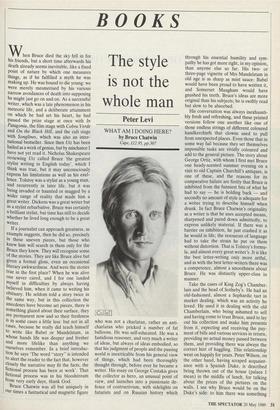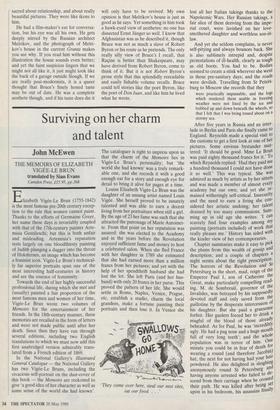BOOKS
The style is not the whole man
Peter Levi
WHAT AM I DOING HERE? by Bruce Chatwin
Cape, £12.95, pp.367
When Bruce died the sky fell in for his friends, but a short time afterwards his death already seems inevitable, like a fixed point of nature by which one measures things, as if he fulfilled a myth he was making up. He was bound to die young: we were merely mesmerised by his various narrow avoidances of death into supposing he might just go on and on. As a successful writer, which was a late phenomenon in his meteoric life, and a deliberate attainment on which he had set his heart, he had passed the prize stage at once with In Patagonia, the film stage with Cobra Verde and On the Black Hill, and the cult stage with Songlines, which was also an inter- national bestseller. Since then Utz has been hailed as a work of genius, but by mischance I have not yet read it. Nicholas Shakespeare reviewing Utz called Bruce 'the greatest stylist writing in English today', which I think was true, but it may unconsciously express his limitations as well as his exel- lence. Tolstoy was a stylist as a young man, and recurrently in later life, but it was being invaded or haunted or mugged by a wider range of reality that made him a great writer. Dickens was a great writer but as a stylist rebarbative. Bruce was certainly a brilliant stylist, but time has still to decide whether he lived long enough to be a great writer.
If a journalist can approach greatness, as example suggests, then he did so, precisely in these uneven pieces, but those who knew him will search in them only for the Bruce they knew. They will recognise some of the stories. They are like Bruce alive but given a formal gloss, even an occasional literary awkwardness. And were the stories true in the first place? When he was alive one never cared, and I for one landed myself in difficulties by always having believed him, when it came to writing his obituary. He seldom told a story twice in the same way, but in this collection the anecdotes have become set pieces, there is something glazed about their surface, they are permanent now and so their freshness is in some cases a little less: but not in all cases, because he really did teach himself to write like Babel or Mandelstam, in whose hands life was deeper and fresher and more lifelike than anything we ourselves remember. In a brief introduc- tion he says 'The word "story" is intended to alert the reader to the fact that, however closely the narrative may fit the facts, the fictional process has been at work'. That fictional process was in his bloodstream from very early days, thank God. Bruce Chatwin was all but uniquely in our times a fantastical and magnetic figure who was not a charlatan, rather an anti- charlatan who pricked a number of fat balloons. He was self-educated. He was a fastidious reasoner, and very much a writer of ideas, but always of ideas embodied, so that his judgment of people and the passing world is inextricable from his general view of things, which had been thoroughly thought through, before ever he became a writer. His essay on George Costakis gives the collector as hero, an unusual point of view, and launches into a passionate de- fence of contructivism, with sidelights on futurists and on Russian history which through his essential humility and sym- pathy he has got more right, in my opinion, than anyone else so far. His two- or three-page vignette of Mrs Mandelstam in old age is as sharp as mint sauce: Babel would have been proud to have written it, and Somerset Maugham would have gnashed his teeth. Bruce's ideas are more original than his subjects; he is swiftly read but slow to be absorbed.
His conversation was always inexhausti- bly fresh and refreshing, and these printed versions follow one another like one of those endless strings of different coloured handkerchiefs that clowns used to pull from unexpected places. Even those that in some way fail because they set themselves impossible tasks are vividly coloured and add to the general picture. The story about George Ortiz, with whom I first met Bruce one heady-scented summer evening on a visit to old Captain Churchill's antiques, is one of these, and the reasons for its comparative failure are firstly that Bruce is inhibited from the funniest bits of what he had to say — he is holding back — and secondly no amount of style is adequate for a writer trying to describe himself when drunk. In fact Bruce Chatwin's originality as a writer is that he uses accepted means, sharpened and pared down admittedly, to express unlikely material. If there was a barrier on inhibition, he just crashed it as he would in life; the resources of language had to take the strain he put on them without distortion. That is Tolstoy's formu- la, and almost every great writer's. It is like the best letter-writing only more artful, and as with the best letter-writers there was a competence, almost a smoothness about Bruce. He was distinctly upper-class in manner.
Take the cases of King Zog's Chamber- lain and the head of Sotheby's. He had an old-fashioned, almost a Sephardic tact in market dealing, which was an activity he loved. He used it in dealing with the old Chamberlain, who being ashamed to sell and having come to trust Bruce, used to lay out his collection and make him presents from it, expecting and receiving the pay- ment of bills and various services in return, providing no actual money passed between them, and providing there was always the correct hint of haggling. This relationship went on happily for years. Peter Wilson, on the other hand, having scraped acquaint- ance with a Spanish Duke, is described being thrown out of the house (palace I mean) in the middle of lunch, for talking about the prices of the pictures on the walls. I see why Bruce would be on the Duke's side: to him there was something sacred about relationship, and about really beautiful pictures. They were like ikons to him.
He had a film-maker's ear for conversa- tion, but his eye was all his own. He gets deeply stirred by the Russian architect Melrikov, and the photograph of Melri- kov's house in the current Granta makes you see why. If you read him without this illustration the house sounds even better; and yet the faint suspicion lingers that we might not all like it, it just might look like the back of a garage outside Slough. If we are really post-modernists, it is a queer thought that Bruce's finely honed taste may be out of date. He was a complete aesthete though, and if his taste does die it will only have to be revived. My own opinion is that Melrikov's house is just as good as he says. Yet something in him took a hawk-eyed view of aesthetes: no one has dissected Ernst Jiinger so well. I know that Afghanistan was as he described it, though Bruce was not as much a slave of Robert Byron or his route as he pretends. The only really silly view of Bruce's I recall, that Racine is better than Shakespeare, may have derived from Robert Byron, come to think of it. But it is not Robert Byron's prose style that this splendidly rereadable and easily fishable volume recalls. Bruce could tell stories like the poet Byron, like the poet of Don Juan, and like him he lived what he wrote.



































































 Previous page
Previous page